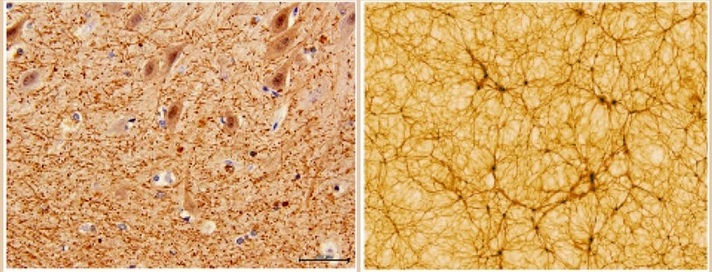Understanding Brain Health via Cosmological Health, and vice versa

LEFT: SECTION OF CEREBELLUM (DR. E. ZUNARELLI, UNIVERSITY HOSPITAL OF MODENA); RIGHT: SECTION OF A COSMOLOGICAL SIMULATION (VAZZA ET AL. 2019 A&A). CREDIT: UNIVERSITY OF BOLOGNA
Neuroscience Meets Astrophysics: Does the Human Brain Resemble the Universe? (SciTechDaily):
In their paper published in Frontiers of Physics, Franco Vazza (astrophysicist at the University of Bologna) and Alberto Feletti (neurosurgeon at the University of Verona) investigated the similarities between two of the most challenging and complex systems in nature: the cosmic network of galaxies and the network of neuronal cells in the human brain.
Despite the substantial difference in scale between the two networks (more than 27 orders of magnitude), their quantitative analysis, which sits at the crossroads of cosmology and neurosurgery, suggests that diverse physical processes can build structures characterized by similar levels of complexity and self-organization.
The human brain functions thanks to its wide neuronal network that is deemed to contain approximately 69 billion neurons. On the other hand, the observable universe can count upon a cosmic web of at least 100 billion galaxies. Within both systems, only 30% of their masses are composed of galaxies and neurons. Within both systems, galaxies and neurons arrange themselves in long filaments or nodes between the filaments. Finally, within both systems, 70% of the distribution of mass or energy is composed of components playing an apparently passive role: water in the brain and dark energy in the observable Universe.
The Study:
The Quantitative Comparison Between the Neuronal Network and the Cosmic Web (Frontiers in Physics):
- From the Introduction: “Central to our vision of Nature are two fascinating systems: the network of neurons in the human brain and the cosmic web of galaxies … Although the relevant physical interactions in the above two systems are completely different, their observation through microscopic and telescopic techniques have captured a tantalizing similar morphology, to the point that it has often been noted that the cosmic web and the web of neurons look alike.”
- From the Discussion: “We have presented a detailed comparison between the neuronal network and the cosmic web, two of the most fascinating and complex networks in Nature, with the goal of assessing the level of similarity between these two physical systems in an objective way…Together with the rest of the analysis presented in this work, such similarities are meant to motivate the development of more powerful and discriminating algorithms to pinpoint analogies and differences of these fascinating systems, almost at the conceivable extremes of spatial scales in the Universe.”


